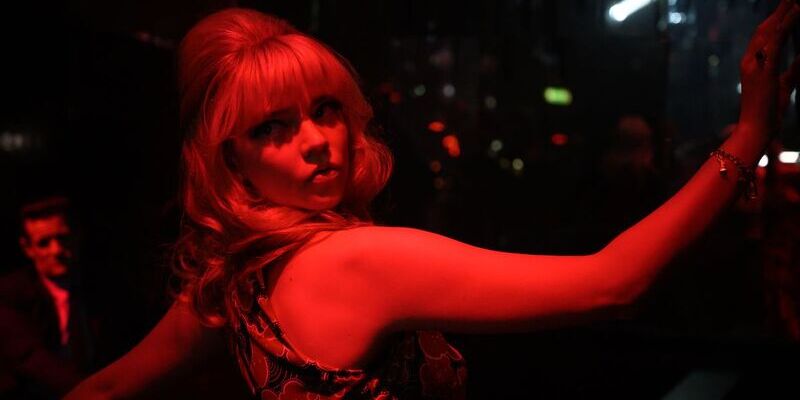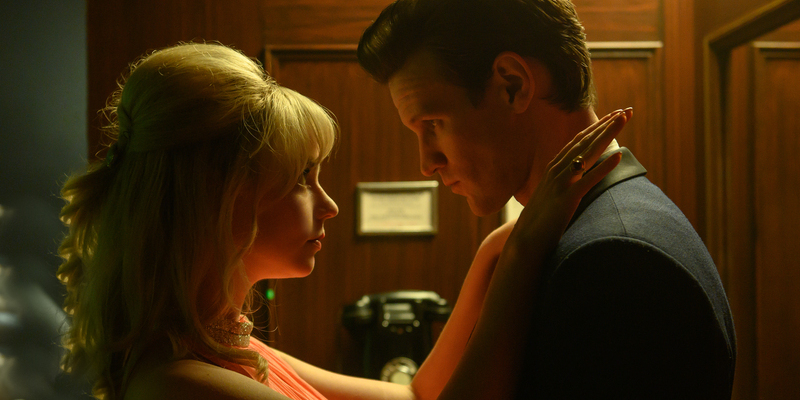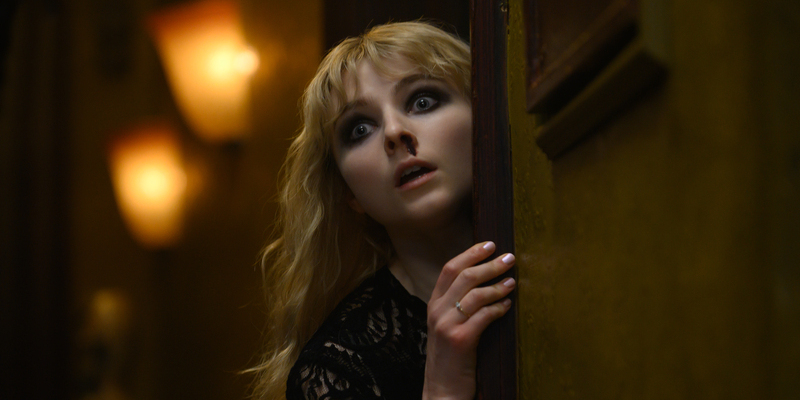
Review by
Eric Hillis
Directed by: Edgar Wright
Starring: Thomasin McKenzie, Anya Taylor-Joy, Matt Smith, Terence Stamp, Diana
Rigg, Margaret Nolan, Michael Ajao, Rita Tushingham

A Frankenstein's monster assembled from various body parts cleaved from the
corpses of other movies and TV shows (Midnight in Paris, The Haunting of Julia, Nightmare on Elm Street,
Sapphire and Steel
and The Future Ghost being the main influences),
Edgar Wright's Last Night in Soho displays promising
early signs of intelligent life before spending most of the movie shambling
about knocking over bits of lab equipment.
Much of that early promise comes courtesy of the presence of rising star
Thomasin Mckenzie. The Kiwi ingenue is gifted her first lead role as
Ellie, a naive young fashion student who leaves Cornwall for London. It's a
city she's romanticised in her head, thanks to her obsession with the
swinging '60s. When she gets there she finds the UK capital's streets aren't
paved with gold, as she's immediately hit on by the sleaziest cabbie since
Gordon Willis's psycho-thriller Windows and is mocked by
her bitchy classmates.

Ellie leaves her student dorm and takes a room in the home of Ms Collins
(Diana Rigg). When she falls asleep she finds herself transported
back to 1966 and into the body of Sandy (Anya Taylor-Joy), a young
woman who once lived in the same room. Sandy is an ambitious dollybird who
wants to be a star. Taken under the wing of sinister wideboy Jack (Matt Smith), Sandy sets down the path trodden by many previous ill-fated blondes from
Marilyn Monroe to Mary Millington. At first, escaping into the life of Sandy
is something Ellie embraces, but when the truth of Sandy's sad existence
become clear, Ellie finds herself haunted by ghosts of the past.
Through the prism of 1960s London,
Last Night in Soho attempts to slot into the recent MeToo
movement, and does so in the clunkiest, most confusing fashion. Initially
Sandy is portrayed as a feisty figure, which makes it odd when the film
reduces her to a one-dimensional victim. Like the recent MeToo
misfire Promising Young Woman, Last Night in Soho throws the baby out with the bathwater
by seeming to portray sexuality itself as equivalent with abuse. There's a
scene in which Sandy finds herself a chorus girl in a Soho burlesque revue,
performing a routine based around Sandie Shaw's Puppet on a String. It's a
completely innocent piece of burlesque, no saucier than the sort of routine
you would have seen at teatime on a 1980s British variety TV show. But
Wright shoots it as a nightmarish sequence, which comes off as laughable in
this age where burlesque is seen as a means of empowerment by most women.
Were the old bat still alive, Mary Whitehouse would condemn Wright's film
for its violence but applaud its conservative view of sex.

Thing is, that sequence is also the best scene in the picture. Wright
shoots and edits the hell out of it, with an audience of off-duty Tory MPs
clapping their hands along in perfect rhythm to its beat. The director wants
you to find the whole scenario appalling, but it's a thing of beauty, the
only scene in the movie you might want to revisit. I'm guessing Wright is
trying to replicate the cabaret scene from Joseph Losey's
Mr. Klein
or the Hitler Youth sequence of Bob Fosse's Cabaret, but it completely backfires. Nobody but the most uptight prude would
watch this sequence and think "Isn't this horrific?", but rather "What a
well designed musical number."
As confused as the film's muddy sexual politics are the details of its
supernatural element. Ellie has some form of ESP, which allows her to see
her mother, who committed suicide while she was a child, in a mirror in her
bedroom. It's established, like so many of Last Night in Soho's plot points, through exceptionally clunky dialogue. It seems Ellie can
only see her mom in the room where she died, which initially would seem to
explain her visions of Sandy in the bedsit. But at first Ellie only sees
Sandy when she falls asleep, unlike her mother, whom she can see while
awake. And then Ellie begins to see ghosts outside the bedsit. It all leads
to a twist borrowed from a certain cult thriller of the early 1970s that
makes no sense in its context here.

Like his young protagonist, Wright seems enamoured by '60s London, and
revels in his film's flashbacks to that era. The movie only ever really
springs to life when some classic pop tune drops on the soundtrack and its
protagonists hit the dancefloor. Based on this and his previous movie,
Baby Driver, Wright could probably make a hell of a musical (rather than any '60s
thriller it's the '80s musical Absolute Beginners that
Last Night in Soho feels most indebted to). Sadly, such
sequences are few and far between here, and whenever we're stuck in modern
day London it's shot with the blandness of an episode of Hollyoaks, with
writing to match.
Every now and then some '60s icon will pop up (along with Rigg there are
appearances from Terence Stamp, Rita Tushingham and
Margaret Nolan) or Wright will reference some old movie, but it
really just comes off as throwing crumbs to cinephiles. With his many
podcast appearances and affable social media presence, Wright is the closest
we have to an Alex Cox figure today, someone committed to educating the kids
on the joys of cult cinema while establishing their own personal canon. The
difference is, while hosting BBC's Moviedrome, Cox was making movies that
were actually about stuff. Wright's movies are just about how much he loves
movies. That often works for Tarantino, but Wright has yet to prove himself
as capable a filmmaker as his American contemporary.

